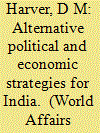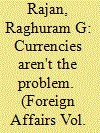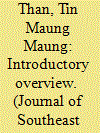|
|
|
Sort Order |
|
|
|
Items / Page
|
|
|
|
|
|
|
| Srl | Item |
| 1 |
ID:
133568


|
|
|
|
|
| Publication |
2014.
|
| Summary/Abstract |
D M Harver analyses the changing patterns of political ideology and economic thinking in India post-1985 and looks at the changing economic philosophy embraced by successive central and state governments. He also traces the main causes of the re-emergence of religiosity as a political factor.
|
|
|
|
|
|
|
|
|
|
|
|
|
|
|
|
| 2 |
ID:
101911


|
|
|
|
|
| Publication |
2011.
|
| Summary/Abstract |
The current debate over quantitative easing overlooks the important question of domestic economic strategy in both the developed and developing world. Put simply, consumers in industrial economies buy too much, and those in developing ones, too little.
|
|
|
|
|
|
|
|
|
|
|
|
|
|
|
|
| 3 |
ID:
132569


|
|
|
|
|
| Publication |
2014.
|
| Summary/Abstract |
President Thein Sein's government launched a series of political, economic and administrative reforms soon after assuming power in March 2011. The economic reform agenda emphasizes good governance, transparency and accountability while including measures for attracting foreign direct investment (FDI), liberalizing trade, enhancing regional economic cooperation, reducing the state's economic role, boosting productivity and balancing equity with efficiency. A more systematic exposition of reforms is the government's Framework for Economic and Social Reforms (FESR). With the removal of most of the Western punitive sanctions, liberalization of finance, banking, trade and investment sectors and replacement of the overvalued fixed exchange rate with a managed float, Myanmar, with its rich natural resources and virtually untapped market, has become the favoured emerging market for the international business community. However, the country's economic transition is not going to be smooth as there are many structural and other problems inherited from decades of mismanagement and neglect, as well as socio-political challenges. Meanwhile, little research on problems and issues in the various economic sectors is available to the reformist government, whose lack of capacity makes it all the more difficult to institute reforms. However, the returning international financial institutions, Western government-linked aid agencies and private consultancies have brought in expertise to narrow the information gap. In this special edition on Myanmar reforms, issues related to external trade, exchange rate, finance, banking, business environment and potential economic strategies, which are vital components of the reform agenda and crucial for Myanmar's sustained growth, are analysed.
|
|
|
|
|
|
|
|
|
|
|
|
|
|
|
|
|
|
|
|
|